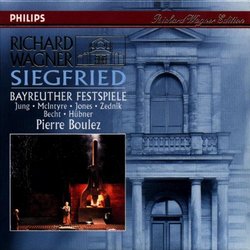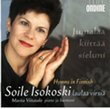| All Artists: Wagner, Jung, Boulez, Bfo Title: Siegfried Members Wishing: 1 Total Copies: 0 Label: Philips / Polygram Records Release Date: 1/19/1993 Genre: Classical Style: Opera & Classical Vocal Number of Discs: 3 SwapaCD Credits: 3 Other Editions: Siegfried UPC: 028943442329 |
Search - Wagner, Jung, Boulez :: Siegfried
CD DetailsSimilar CDs |
CD ReviewsThe inventor of modernity Jacques COULARDEAU | OLLIERGUES France | 07/16/2008 (5 out of 5 stars) "Wagner, in the middle of the 19th century, while Italy was fully invested in Bel Canto and France was engaged in operatic imitation of Italian operas with more melodramatic content or/and in operatic pale imitation of something more Germanic without being really German, just plain more martial on more Germanic themes like Faust or/and in the invention of the operetta that will become the American or maybe Anglo-Saxon musical, Wagner, said I, invented the modern opera. If it is considered as German, this is slightly erroneous. It is German because it was really started in Germany by the German composer Wagner. But it is truly universal because it was to become the modern opera of the 20th century with Richard Strauss, Alban Berg, Prokofiev, Stravinsky and all the next generations from André Previn to Pizzetti or Duruflé and so many others like Janacek. What was this revolution all about? First it is a musical revolution. The music is there to emphasize the plot and the atmosphere not to entertain the audience or give the singers some virtuoso moments. The singing has nothing to do with bel canto. It is truly dramatic and is supposed to express the feelings of the characters, the changing moods and feelings of the characters. The singing can reach some moments of more regular structure at some very dramatic moments with long solos or duets. It is rare and very expressive of what is happening on the stage. It has to be highly emotional and not pleasant or agreeable or even nice and beautiful, though it is utterly beautiful in this new dimension. Wagner also moves to a higher level in his subjects. Of course he speaks of love and war and violence and honor and courage and all these very operatic values but he forgets about the Bible, classical mythology or even exotic Islamic or just plain oriental niceties. He goes back to the stock of mythological and folkloric beliefs and tales that are the roots of the Germanic soul, of the Germanic and Nordic traditions. He finds in these themes a callous and rough humanity that enhances all human feelings with an extreme emphasis set on courage, faithfulness and love as the building and saving values of humanity not the decorations of some mundane life. This not human nor humane but humanistic inspiration is new on the operatic stage though Goethe and Schiller, or Victor Hugo had used these new lines of inspiration on the dramatic stage. Siegfried is the first opera of a quadrilogy, Der Ring des Nibelungen, and it is the archetype of a Wagnerian opera. Wagner changes the old myth in quite a few details to make it more potent. For instance he links the killing of the dragon to the awakening of Brünnhilde who becomes Siegfried's paramour, he makes Siegfried an orphan who does not even know his parents, he makes Mime a dwarf that has nothing to do with Fafner instead of being his brother, and so on. Siegfried becomes the rebellious teenager he could be and Mime the envious and possessive but also lonely smith he could be, though both could have been quite different and were in the tradition, and then the rivalry between the two has a very human and modern ring. Wagner widely uses Wotan, the Wanderer, the one-eyed god who delivered the runes to the humans and was tortured for it. He also uses Erda, the goddess of the earth, or the earth mother herself. That gives to the divinity the very old traditional bisexual nature and dimension, though the two sexes are separated, quite a difference with older traditions behind the Nordic and Germanic mythologies in which the central god figure is both male dominant and female dominated, a character we find in Boewulf for example (his name with the feminine Beo and the masculine Wulf). These changes transform the story into a myth of teenage initiation to craft and work, to courage and heroism, to love and of course sex. I insist on this ternary figure because Wagner is keen on using it at every single level of his text, singing or music. It is a fundamental Indo-European figure or pattern, some would say motif, which is in total opposition to the binary nature of the Semitic old testament's god or the absolutely unitary nature of god in the other Semitic tradition, Islam. In fact we can easily demonstrate that the trinity of the Christian is a return of a pagan tradition, a non-Semitic tradition coming from Persia, that is to say the melting pot from which the Indo-Europeans and their mythologies have come. It is not Christian in Wagner. It is deeply pagan, thanks god it is. And musically of course it is in perfect agreement with the triumph of the archetypical ternary tempo that had just been invented, a tempo that is so Germanic in many ways, the waltz. Dr Jacques COULARDEAU, University Paris Dauphine, University Paris 1 Pantheon Sorbonne & University Versailles Saint Quentin en Yvelines " Good Overall Steven Muni | Sutter Creek, CA USA | 06/11/2008 (4 out of 5 stars) "This 1980 live recording from Bayreuth has many wonderful things going for it. What it doesn't have is a particularly strong heldentenor in the title role. But first, the good stuff. Pierre Boulez leads the Bayreuther Festspiele in a focused and energetic version, and gets tremendously exciting playing from his ensemble. Gwyenth Jones is in top form as Brunnhilde, with glorious rich tone, tremendous drama, and none of her signature wobble evident. Donald McIntyre as the Wanderer has a rich and powerful voice, with an attractive timbre, and gives a compelling and forceful performance. The other roles are all also uniformly well done, with special mention to Heinz Zednik's sly and complicated Mime. The sound quality is excellent--but then Bayreuth has some of the best live recordings going. As Siegfried, however, Manfred Jung just doesn't compare with the likes of Siegfried Jerusalem or Alberto Remedios, let alone Wolfgang Windgassen or Ludwig Suthaus. He's not bad, he just doesn't have a real heldentenor voice. In all fairness, this is perhaps the most punishing tenor role in Wagnerian opera, but he neither gives a particularly thrilling account, nor is is voice particularly strong. And by his duet with Brunnhilde, he is clearly tiring. But it's still worth 4 stars." Wagner's Finest Music-Drama? An Argument for Siegfried... Sébastien Melmoth | Hôtel d'Alsace, PARIS | 06/15/2009 (5 out of 5 stars) "Wagner's Finest Music-Drama? An Argument for Siegfried...
. They're all superlative, but which is Wagner's single finest music-drama? Some might answer, "Tristan"; others, "Parsifal" or "Meistersinger" (or perhaps, "Götterdämmerung" or even "Walküre"). Curiously enough, an argument could be made for the sometimes "forgotten" drama, Siegfried. What commends Siegfried for the title of Wagner's Finest Drama? A chronology: 1854 - Rheingold 1856 - Walküre 1859 - Tristan und Isolde 1861 - "Paris" Tannhäuser 1867 - Meistersinger von Nürnberg 1871 - Siegfried 1874 - Götterdämmerung 1882 - Parsifal The completed score of Siegfried falls exactly in the "sweet-spot" of Wagner's oeuvre, reflecting his perfect amalgam of vocal and orchestral art--that peerless synthesis of the Apolline and Dionysiac ethoi (--with a subconscious Socratic critique of capitalistic political economy, its allegorical design disclosed by G. B. Shaw in The Perfect Wagnerite). Siegfried is THE Nietzschean über-mensch--"that heroic man [who] will hew the way of his own Will through religions and governments and plutocracies and all the other devices of the kingdom of the fears of the unheroic": it's all about Siegfried... And the erotic happiness of the union of Siegfired and Brünnhilde expresses the wish "that the supreme good of love is that it so completely satisfies the desire for life that after it the Will to Live ceases to trouble us, and we are at last content to achieve the highest happiness of death." This is "love as the fulfiller of our Will to Live and consequently our reconciler to [the inevitable] night and death. Enlightening love and laughing death involve each other so closely as to be virtually one and the same thing." The drama Siegfried features only eight characters--four major and four minor, which fosters comprehensibility. And this Boulezean reading (1980) is clear and concise, esthetically falling in between Solti's milestone (1958-65) and Karajan's mannered masterwork (1967-70), alongside Levine's credible readings (1987-89). . Wagner - Der Ring des Nibelungen (Ring Cycle) / Sir Georg Solti Siegfried . Der Ring des Nibelungen / Karajan / Berlin Philharmonic Wagner: Siegfried Wagner - Die Meistersinger von Nurnberg / Kollo · Donath · Adam · G. Evans · Schreier · Hesse· Riderbusch · Karajan . Wagner: Der Ring des Nibelungen [Box Set] Parsifal . Wagner: Der Ring Des Nibelungen Richard Wagner: Siegfried . Tristan Und Isolde ." |


